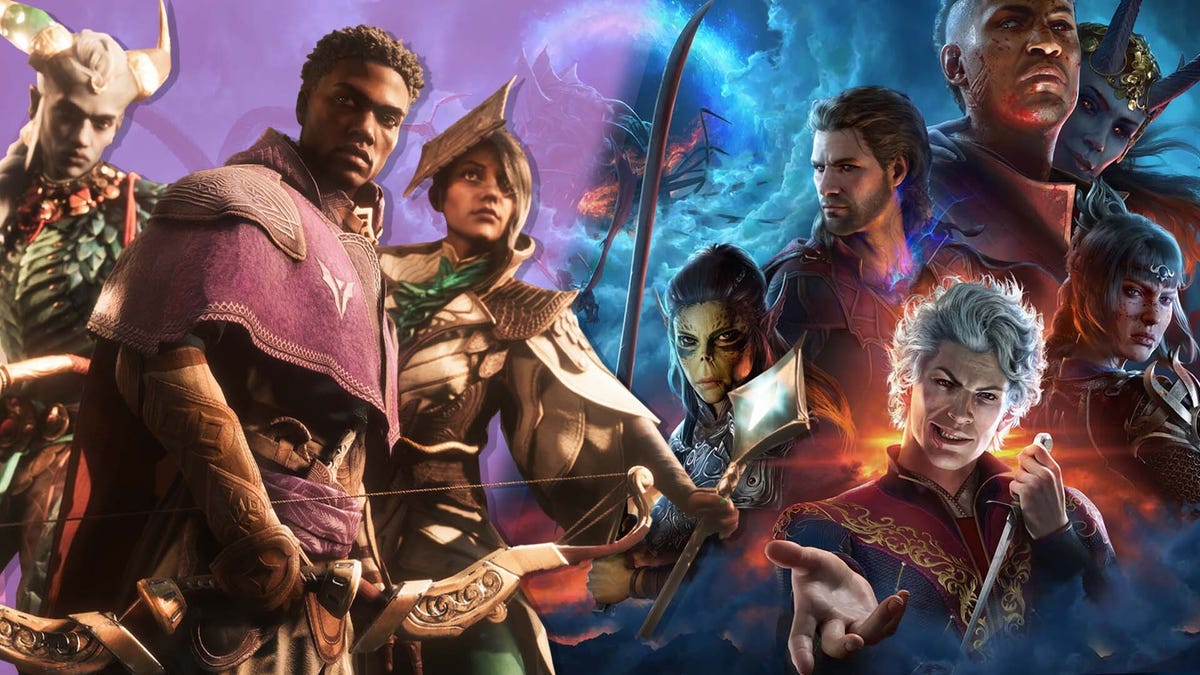*Dragon Age: The Veilguard *is going to be divisive. It already is. When you’ve spent ten years waiting for something with an idea of what it would be in your head, if it’s not that thing, you’re bound to be disappointed. But ultimately, *The Veilguard *is not trying to accomplish the same things *Baldur’s Gate 3 *did. Its focus on action-based systems means we’re probably not going to get the highly reactive, Dungeons & Dragons-esque spells and problem-solving mechanics. But it does mean we’re going to get what looks like a frenetic action RPG that continues the story we’ve been waiting a decade for. That might not be what you wanted from Dragon Age, but that other game exists.
Maybe I’m in the minority or I’m just missing something but I don’t really understand the whole thing of gatekeeping which games people can compare to which other games. Yes they are different types of games but so what? You can meaningfully compare even BG3 to CoD just based on the fact that they are both games that cost money and provide some entertainment.
Maybe I’m just missing the point.
Games are art. Just because two musicians make different genres of music, doesn’t mean I can’t compare them. Especially when it’s clear that one is making a certain genre because they know it will sell well, and the other is making the music they are passionate about making.
Game journalism is a marketing tool. When pieces come out preemptively defending a product (any product) from some specific criticism, it’s because the company is both confident that those criticisms will be levied, and that they won’t shake out favourably.
That’s it, that’s the whole reasoning.
They know they won’t come out looking in any way comparable in terms of scope, quality, etc, and they’re putting their hands forward through their connections with the press, hoping at least some people will buy this obvious attempt at ass covering and refrain from publicly criticising their product.
I think it’s like 70% that and 30% that all games journalists are also fans (this maybe isn’t true of, say, political journalists) who are always walking an ethical line between saying the truth and geeking out about getting status, access, power and free stuff from these companies. So it also makes them more likely to preemptively defend their golden goose/favorite studios and brands like a kid on a playground, except they might lose kickbacks in the future if they don’t become ardent defenders.
Also, I loved DA:O, and DA2 was OK, I didn’t finish DA:I and I have very very very little interest in this game until I see lots of reviews after its released. Sorry BioWare, but ya basic.
I think you can compare whatever you want. The farther apart the two things are though – apples to oranges – the more the comparison becomes a matter of your taste and opinion rather than a critical, objective comparison.
I would say almost all comparison is subjective unless you are comparing something like price or the presence/absence of a feature like multiplayer.
Don’t give gatekeepers the benefit of the doubt. If they don’t want to see opinion articles about games, they can block the community.
Predicting the games will have differences does not entitle you to limit other people’s tools of evaluation (comparison is a tool of evaluation).
I agree. They’re two different games. Both fantasy sure, but they really are apples to oranges.
I for one judge any game mostly on two factors. One, did I have fun. Two, what was the cost per hour to play? Beyond that, it’s hard to compare two completely separate games.
I think it would be totally fair to compare the new Dragon Age to DA: Origins, in the context of talking about all of the depth of writing and roleplay that will be lost (as it looks like they’re going a very different direction for the series). The new game looks fundamentally worse as a work of art compared to the original.
In that conversation, I think it’s reasonable to bring up the fact that a game came out last year which copied the DA:O formula in every way, and became the bestselling fantasy RPG of the last decade.
One could absolutely ask what BioWare is thinking straying so far from the original, successful, formula. The answer of course is valuing short-term profit over the creating of something that will stand the test of time.
One could absolutely ask what BioWare is thinking straying so far from the original, successful, formula. The answer of course is valuing short-term profit over the creating of something that will stand the test of time.
“SoulsLike games sells well, let’s make dragon age a souls like” is what they thought
Baldurs Gate 3 did not copy the Dragon Age formula, Dragon Age did not create it in the first place.
DAO presented a very specific iteration of the cRPG formula, and that iteration is the closest I’ve seen to BG3.
I’m not criticizing BG3. I think it’s awesome that Larian structured the game so much around the same skeletal structure as DAO.
Oh I understand now, thanks for clarifying.




